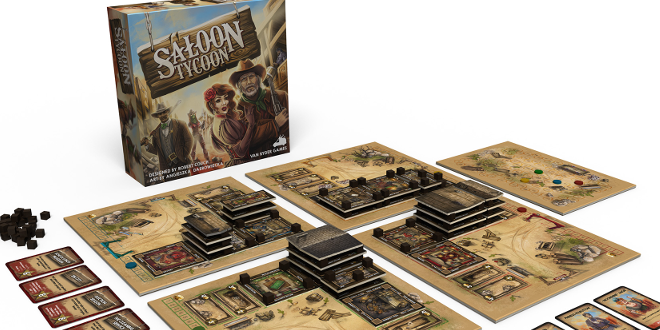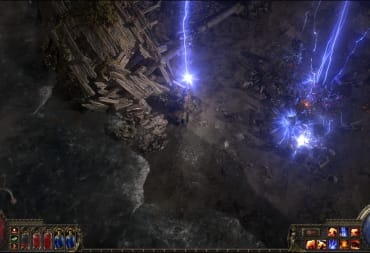Every couple of weeks, TechRaptor's head tabletop guy Travis Williams slides me an e-mail showing me some upcoming games, asking me if I'm interested in them. In this particular case, the game was called Saloon Tycoon by Van Ryder Games. It interested me, e-mails were sent, and a prototype copy was mailed to my home for the purposes of a preview.
I liked the look of a game. I like building stuff. My dad is a master carpenter and can (and has) built a home from the foundation up. I liked building things ever since I was a kid, and the uncomfortable amount of hours I have in games like Minecraft, Terraria, and Cities: Skylines testify to that fact. So when I have the opportunity to look at a board game that's all about building the best Saloon in the rootin' tootin' Wild West, heck, sign me up!
 Before I go further, I need to make it very clear that I have a prototype copy of the game. Some images (the header image of this article included) were provided by Van Ryder Games and will be disclosed as such. The pictures I took will show the prototype that I received. I didn't have the finished retail product, and so I can't ethically do a Review. I can't comment on the quality of the physical game pieces that will be in the product you receive if you buy the game.
Before I go further, I need to make it very clear that I have a prototype copy of the game. Some images (the header image of this article included) were provided by Van Ryder Games and will be disclosed as such. The pictures I took will show the prototype that I received. I didn't have the finished retail product, and so I can't ethically do a Review. I can't comment on the quality of the physical game pieces that will be in the product you receive if you buy the game.
What I can tell you is that the prototype game pieces were all sturdy and well-made. If the quality of the retail product is similar to what I received, I think that it will definitely be a quality game overall. Now that I have that stuff out of the way, let's go over the game's setup and rules.
Saloon Tycoon pits two to four players against one another in a competition to build the best darn saloon in the Wild West. Players will acquire helpful citizens as well as harmful outlaws, complete Claims (quests), and try to amass the most Reputation points by the end of the game.
Saloon Tycoon begins with a bit of setup. Players start by taking their own individual boards and associated pawns. All of the cards and tiles are arranged into their respective stacks. Each player receives three Tycoon cards. Tycoon cards allow players to collect gold, complete extra actions, steal from other players, and more.
The next step in setup is to put out Open Claim cards equal to the number of players +2. These 4-6 Open Claim cards serve as quests in Saloon Tycoon—any player can try to meet the criteria of the Open Claim cards. The first person to meet the criteria permanently claims the card for themselves, as well as the associated Reputation points.
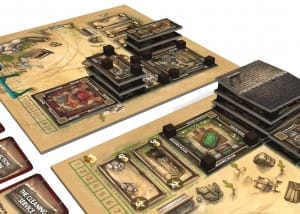
Open Claims consist of a variety of different conditions. Some will require certain arrangements of rooms. Some will require that a player merely be the first to acquire three Citizens total. Some Open Claims may be rendered unattainable during the game. For example, an Open Claim might require that a player build two unique rooms. If one player owns one of the rooms and another player takes the other, that particular Open Claim can no longer be won by anyone as rooms cannot change hands.
After the Open Claims are all set up, players are handed four Secret Claim cards apiece. Secret Claims are similar to Open Claims in that they serve as quests for the players to complete. Players choose two of the four cards and discard the other two. The size of both the Open Claim and Secret Claim decks ensures a fair bit of variety in the gameplay. Additionally, the hidden nature of Secret Claims makes it possible for players to pursue strategies in a non-obvious manner. For example, one of my Secret Claims required that I build four of the same room type. I saved up the necessary gold and Tycoon cards to accomplish the task and then built all four tiles on the same turn. Had I not, another player may have noticed me building the same type of room one after another and took one for themselves in order to deny me Reputation points.
Saloon Tycoon would have been a good game on its own without the Open and Secret Claims. The randomness they add to each game changes Saloon Tycoon from a good game to a great game in my opinion. No two games are going to play similarly, and even if you draw similar Open Claim cards—a situation my playtesting group encountered once—everyone will almost certainly end up with different Secret Claims. The Open and Secret Claims adds critical variety and randomness to Saloon Tycoon, and they are much appreciated.
The next step of setup is for the Citizens (beneficial cards) and Outlaws (harmful cards) to be placed Face-up on the table. Citizens are worth 5 Reputation points apiece at the conclusion of the game. They're typically acquired by building unique rooms. Outlaws are much the opposite—they have negative effects associated with them that last throughout the game.
Outlaws are acquired once certain conditions are met. For example, the first player to build 5 tiles is stuck with "Moonshine" Angie. "Moonshine" Angie requires that you discard a Tycoon card every time you wish to play one, and if you only have one Tycoon card, you can't play it at all. Once an Outlaw is in play they stay in play—the best you can hope to do is to pawn them off on another player.
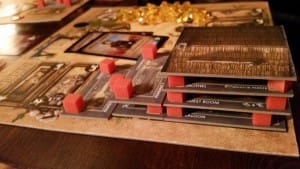
Each of the Outlaws have a condition that would apply to different strategies. The first to acquire five Supply ends up with an Outlaw that raises the cost of Supply from 2 Gold Nuggets to 3 Gold Nuggets apiece. The first person to reach 10 gold on their turn is stuck with an Outlaw that reduces their gold income by 1. There do not appear to be any winning "rush" strategies that won't be stalled by an Outlaw. In this sense, Outlaws encourage a balance of gameplay. Players can elect to focus on one thing, but they may end up hurting themselves for a few turns with an Outlaw in their saloon.
After the Outlaws and Citizens have been placed, each player is given 3 Gold Nuggets to start. Players earn an income of 1 Gold Nugget per tile, and everyone begins the game with the base Saloon tile.
Lastly, the Supply Cubes have to be counted out. Supply Cubes are the supports for building vertically in Saloon Tycoon. Large tiles require four Supply Cubes and small tiles require three Supply Cubes. Once a room has its Supply Cube allotment fulfilled, that room is considered "completed" and the player receives Reputation points for the feat. Players also receive a bonus specific to the room, such as the ability to complete additional actions or draw additional cards. A second and third floor can be built upon completed rooms tiles and doing so is advantageous for scoring purposes. A completed third floor yields players additional bonus points and is capped off with a special Roof tile.
Supply Cubes aren't just the metaphorical and literal supports of your Saloon—they're a countdown. 20 Supply Cubes are put into a general pool per player. Once there are 8 or fewer Supply Cubes in the tray, the game enters its final round. Players will constantly be using Supply Cubes as it's one of the easiest and most reliable ways to accrue Reputation points. The great thing about this particular mechanic is that it affords some very easy modifications to the rules. If you wish to play a longer game, you can add more Supply Cubes, simple as that.
Now we have an understanding of the pieces of the game and the general setup. The person who most recently watched a Western film or television show goes first and play moves to the left (clockwise).
The turns offer players a variety of choices in their strategy. Every turn in Saloon Tycoon begins the same way. Players take one Gold Nugget for every tile they have in their Saloon. After that, players can elect to do one of the following Actions:
- Play a Tycoon Card
- Draw 2 Tycoon Cards
- Earn 2 Gold Nuggets
- Move a Character Card from one Saloon to another at a cost of 6 Gold Nuggets
- Buy and place 1 Tile
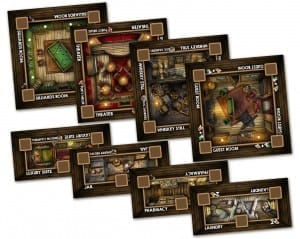
These mutually exclusive options mean that you will sometimes have a turn where you just collect resources. Sometimes you're short on Tycoon Cards. Maybe you need just a few more Gold Nuggets to execute a really cool play the following turn. Perhaps you'd like to be rid of a particularly troublesome Outlaw. You can do one of these things, but you can't do all of these things. This makes it difficult (although not impossible) for players to jump way ahead in a single turn.
Aside from the Actions, players can purchase as many Supply Cubes as they would like. The separation of Supply Cubes as its own thing that can be done in concert with any other Action ensures a steady pace of play. If anything, you can always plonk down a Supply Cube or two and get that much closer to completing a tile and getting the score for it. While Gold Nuggets circulate enough that they are essentially an infinite resource, Supply Cubes are absolutely finite. Sometimes players may even wish to end the game as fast as possible by placing a lot of Supply Cubes in one turn. Of course, players must have open spaces on their tiles to actually place their Supply Cubes—any leftovers get discarded (with no refund!) at the end of their turn. This ensures that players have a constant focus on building.
Once there's eight or fewer Supply Cubes remaining, we enter the last round of the game. Everyone gets one more turn before the score is added up. Nothing is really special about the final round of Saloon Tycoon aside from the risk of running out of Supply Cubes and the stipulation that Character Cards may no longer be moved. This restriction on Character Cards for the final turn increases pressure on players looking to complete a Secret Claim with character requirements. A wise player will save up Gold Nuggets, buy the character they need, and then use the remainder of their funds to purchase enough Supply Cubes to trigger the final round.
Once the game is over, players have their scores tallied. The game comes with a score tracker for players to move along in realtime, but a suggested rule variant is to keep the score secret until the conclusion of the game. In either case, what you see on the score tracker at the end of the final round is not necessarily what you get. Players can have their score go up or down depending on Citizens, Outlaws, and Claims. At the end of the game, the player with the highest Reputation wins.
The instructions provided with my preview copy of Saloon Tycoon stated that a game would take 45-60 minutes to complete. The first game took nearly 2 hours for my group to finish, but that's forgivable as we were all figuring out the rules. Subsequent games were much closer to that estimate but still quite a bit longer than an hour. I imagine that if players took their turns in a comfortable, timely manner instead of staring at their board for five minutes like some people I know the game would conclude within that timeframe.
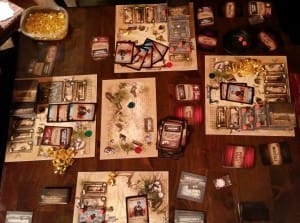
I've very few bad things to say about Saloon Tycoon. There was one issue with the wording on a particular card but an e-mail to the developer left me with assurances that it would be clarified in the final version. To be fair, we encountered a 1 in 100 situation that probably came up very infrequently during playtests.
The one issue I did have with the board is the size needed. We were using a 3 foot by 3 foot table (roughly 1 square meter), and we found ourselves a bit short of space. Granted, we had phones and other assorted doodads on the table ,but Saloon Tycoon still made for a tight fit. It's not as small as Monopoly, but it isn't quite the size of an epic Warhammer 40,000 battle, either. A table similar to (or larger than) the one my group was using could comfortably accommidate a four player game. Smaller tables may require some compromises in how much room you have to move around.
There you have it. You can read my words, look at the pictures, and get an idea of how the game plays. That leaves us with the last, most important question: is the game fun?
Hell yes it is.
We had a blast. The only major annoyance was a certain friend of mine who took forever and a day to make up his mind. He'll remain unnamed because he knows who he is and he does this for every single game ever. (To his credit, he's gotten better at it lately.)
We played a couple of four player games and one two player game on the playtest night I had at my home. I took some time to look over the cards and game mechanics on my own as well. Experienced tabletop players will get a lot out of this game for all of the variety and depth it provides, but it's easy enough for people completely new to tabletop beyond the standard fare of stuff like Monopoly.
Every element of the game's rules were seemingly designed with careful thought. There is no one overall winning strategy here. The Claim cards ensure that every game is going to be different in terms of what players are trying to accomplish, and the Secret Claims ensure that individual players are going to have varying different goals. I've had a few days to think about it, and I honestly can't think of any way in which the rules of the game fail to address a particular issue or playstyle.
Saloon Tycoon is superbly crafted in terms of game design and a heck of a lot of fun. We don't score Previews at TechRaptor so I can't give you some magic number out of 10 that tells you how much I like it. What I can say is that I will comfortably recommend it as a worthy addition to your tabletop game collection.
The copy of Saloon Tycoon used for this preview was provided by Van Ryder Games. The header image and some interstitial images (where noted) were provided by Van Ryder Games.
What do you think of Saloon Tycoon? Does this style of game interest you? Let us know in the comments below!
Previews you can trust: To ensure you're getting a fair, accurate, and informed review, our experienced team spends a significant amount of time on everything we preview. Read more about how we review games and products.
Have a tip, or want to point out something we missed? Leave a Comment or e-mail us at tips@techraptor.net
